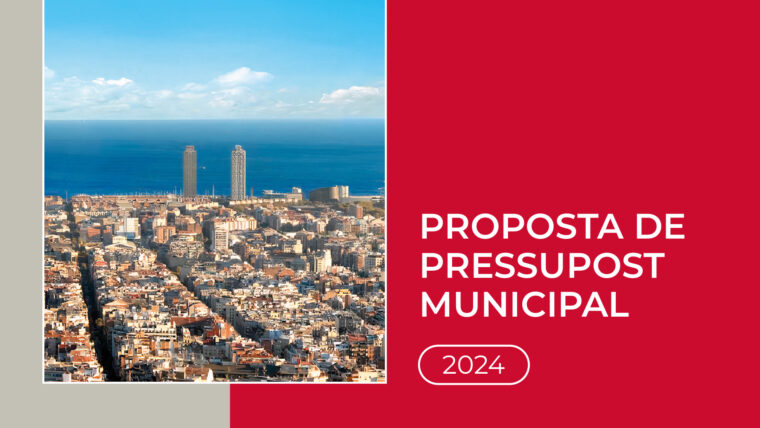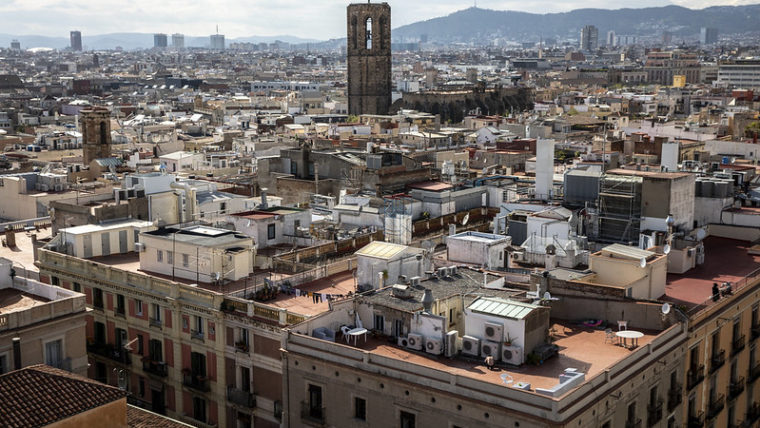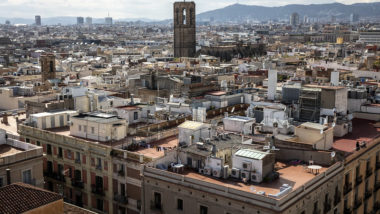A solid, solvent, responsible and ambitious draft budget for 2024
Negotiations will now get under way for the draft municipal budget for 2024, which must drive the economy, provide stability and prioritise people’s well-being. The overall figure comes out at 3,735 million euros, a rise of 3.9% in available resources compared to this year, centring on cleaning and safety in public space, social support, housing and the transformation of the city’s neighbourhoods. Banner for the municipal budget proposal for 2024
Banner for the municipal budget proposal for 2024
The budget responds to the goals for this term of office for the new city government, in five main areas: a prosperous and tidy city geared towards living and coexistence; a leader in the fight against climate change; driving opportunities and technological change; a creative, open and feminist city on a human scale, and a familiar and participatory leadership.
The drafting process sought to keep the city’s economic solvency and stability intact without increasing the tax burden on people. Current income is set to increase by 314 million euros, thanks to the definitive payment of the participation in state revenue and the increase in funding through the municipal surcharge and the Tax on Overnight Stays in Tourist Accommodation (IEET), in particular tourist lets and short-stay cruise ships.
This has led to a goal for greater gross savings and the prevision is to earmark 17% of current income to investments. Debt remains stable at around 32% of current income. Payments to providers continue to well below the maximum of 30 days set out by law, and take around 20 days.
A notable increase is planned in municipal investment and the content of current spending, which prioritises social support, housing, public transport, safety and order in public space.
More current spending aimed at citizens
Current spending is set to rise from the existing 4.3% to reach 2,868.2 million euros, with priority going to public assets and services to guarantee people’s well-being and leave nobody behind.
The policies which entail the greatest current expenditure are social services and social promotion (440.2 million), community well-being (419 million), order and care of public space (waste collection, cleaning, sewerage etc.), and the safety and prevention policy (396 million). Spending on the neighbourhoods is also set to rise by 4.46% to 372.5 million euros.
More investment in public housing
Investment in the city will rise to 905 million euros, between the 777.6 million from the City Council (the highest figure in the last 15 years) and the 127.3 million for work through BSM and the Barcelona Municipal Institute for Housing and Renovation (IMHAB). The priority will be construction and the growth of the public housing stock, with 152.7 million euros in investment.
The big strategic transformation projects for the city will see an economic budget transfer for 2024. This is the case with La Rambla, where an investment of 8 million is planned out of the 48 million to be spent during the whole term of office, or the project to cover the Ronda de Dalt, where 5 million will be invested out of the 33 million to be spent between 2024 and 2027.
In the case of the Neighbourhood Plan, and in keeping with the commitments taken on, an investment of 30 million euros is planned for 2024, as well as 76 million for maintenance and investment in the districts. In addition, 13.6 million will be invested in the first year of the School Climate Control Plan, which involves nearly 100 million between now and 2029 and will be funded with part of the income generated by the tourist tax.
As for the execution of works awarded in 2023, an overall sum of 384.2 million euros will be invested: 20 million on the Mercat d’Horta, 6.2 million on the Abeceria and 7.7 million on the Montserrat; 17.6 million on the third stage of the rainwater tank in C/ Vila i Vilà, 8.1 million on the Túnel de la Rovira, 15.3 million on schools and 1.3 million to complete the library in Sarrià. A further 13.6 million euros is set to be used to continue the work in progress in Via Laietana, and 11.6 million to carry out the transformation committed to for Rda. Sant Antoni.
The budget also entails an investment of 1.3 million euros in economic promotion, to help with the development of new companies.
Tax by-laws 2024
The main goal of not increasing the tax burden for citizens will be maintained. Further steps will be introduced to make it easier for people to defer municipal taxes or pay them in instalments, along with the simplification of environmental discounts and new discounts from the IAE to attract companies that innovate and back knowledge.
More progress will be made with taxes on the tourist activities with the least social return and the greatest impact in terms of the intensive use of public space, such as cruise ships stopping for less than 12 hours and tourist lets, with the municipal surcharge rising from 3,25 euros to 4 euros as from 1 April 2024. If the budget is approved, the combined tax revenue from tourist activity will become the third largest source of municipal revenue for the City Council with an overall value estimated at 95 million euros.
The by-law on terraces will put an end to the 75% discount on this tax, introduced as a special measure to promote economic activity at bars and restaurants and approved in 2020 as one of the exceptional measures for Covid-19. The proposal is to introduce a new progressive scale for the tax according to the number of tables on each terrace.
Dialogue for a consensual budget
The budget proposal for 2024 has been shared with municipal groups in the rounds of talks in recent weeks and will go before the Commission for Economy and Tax in October. Discussions will then begin for its final approval at the end the year.





